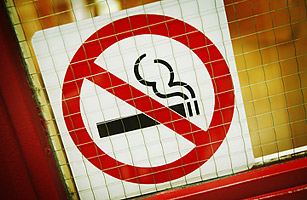
Having been denied the right to puff in public buildings, workplaces and bars, staff and student smokers in Pennsylvania public colleges and universities now find themselves forced to leave campus property before lighting up. And they’re fighting back. Opposition is mounting to a new ordinance banning smoking anywhere within the Pennsylvania State System of Higher Education . As one of the most far-reaching prohibitions in the country, the ordinance forbids smoking both inside and outside campus buildings, in all resident halls and parking lots, and even on university-owned sidewalks. “It’s one thing to stop smoking indoors, but who are they to control what happens outside?” says Steve Dugan, a 20-year-old freshman at Clarion University. “To do so is an infringement on our fundamental right to personal choice.”
School officials counter that the new policy is necessary under a statewide smoking ban passed by Pennsylvania’s legislature in June. That law forbids smoking in most workplaces and public spaces, including educational facilities. PASSHE chancellor John Cavanaugh has said that he interprets the prohibition to extend beyond just school buildings to all campus grounds, such as athletic fields, pathways or courtyards. “Many of our classes meet outdoors when the weather is nice,” says PASSHE spokesman Kenn Marshall. “So it’d be very difficult to pick and choose when to forbid smoking. We chose a comprehensive ban instead.”
In response, students on nearly all PASSHE campuses have organized daily “smoke-in” protests since the ban went into effect on Sept. 11, and they’ve collected hundreds of signatures on petitions against the anti-smoking measures. They’ve found support from faculty and even from nonsmokers. “This law, [the Clean Indoor Air Act], very explicitly defines its terms,” Kutztown University geography professor Steven Schnell, a nonsmoker, told Cavanaugh during a campus visit last week. “I suggest a grammar class for your legal counsel.”
Campus safety is another concern raised by dissenters. Campus residents who wish to smoke late at night now have to walk off the grounds to do so — and they could pose a fire hazard by sneaking a cigarette in a dorm room. “Do we really want an 18-year-old girl walking by herself off-campus at 2 a.m.?” Dugan asks. “All we’re asking for is a compromise that considers students’ needs here.”
Campus employees are threatening legal action against the ban. The American Federation of State, County and Municipal Employees Council 13, which represents 2,500 system employees, and the Association of Pennsylvania State College and University Faculties plan to file an unfair labor practice suit, arguing that to prohibit smoking without negotiations first violates employee contracts. “The system, no matter how politically correct the idea of a smoking ban is, should have negotiated the policy with the union,” says APSCUF president Steve Hicks, adding, “[It] was insensitive to not recognize the impact on their largest constituent group — the students.” PASSHE’s Marshall counters that this claim is moot due to the new statewide anti-smoking act.
While some protest indignantly at the latest encroachment on their space to light up, others welcome the elimination of clouds of smoke outside classrooms. At Clarion, for example, more than 500 students and faculty have signed petitions in support of the ban. That’s great news for anti-smoking coalitions around the country who have been pressing colleges and universities to get stricter on tobacco. Although PASSHE is the first full school system to outlaw smoking, the American Lung Association estimates that about 130 schools now have campuswide bans, while several others have prohibited selling cigarettes on campus or have designated smoking areas away from school buildings.
About 1 in 5 students nationwide smoke, and just how they’ll be sanctioned on PASSHE campuses if they violate the ban remains unclear. At the moment, most smokers can expect a warning if they’re caught lighting up; during a “smoke-in” event at Clarion on Sept. 15, campus police passed out yellow citation cards to protesters who were smoking. But, Marshall says, it is the state’s department of health that will ultimately determine whether offenders should pay a fine, and how much that should be. Which still may not thwart all smokers. “If I’m going to get in trouble for smoking outside,” Slippery Rock University senior Alex McGill told her campus newspaper, “I might as well just light up in class instead of going out in the wind and rain.”